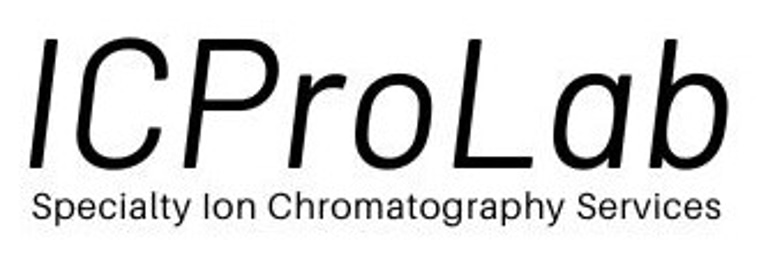Why Choose Ion Chromatography for Transition Metals Analysis and not ICP-OES?
This article reviews reasons to consider IC for Transition Metals instead of ICP-OES. Both techniques are valuable, however, IC may offer an advantage for several sample types.
Jeff Brewer
1/5/20243 min read
Transition metals play a crucial role in various fields, including environmental monitoring, pharmaceuticals, and industrial processes. Accurate and reliable analysis of these metals is essential for ensuring product quality, regulatory compliance, and environmental safety. Two commonly used analytical techniques for transition metals analysis are Ion Chromatography (IC) and Inductively Coupled Plasma-Optical Emission Spectroscopy (ICP-OES).
Ion Chromatography (IC)
Ion Chromatography is a powerful analytical technique that separates and quantifies ions based on their interaction with a stationary phase and mobile phase. It is particularly suitable for the analysis of ionic species, including transition metals. IC offers several advantages for transition metals analysis:
1. Selectivity and Sensitivity:
IC allows for the selective separation and detection of transition metal ions in complex matrices. The stationary phase in IC columns is designed to retain specific ions while allowing others to elute. This selectivity enables accurate quantification of individual metal ions in the presence of interfering species. Additionally, IC can achieve low detection limits, making it suitable for trace-level analysis.
2. Wide Range of Applications:
IC can be applied to various sample types, including aqueous solutions, solid samples, and complex matrices. It is commonly used for analyzing transition metals in environmental samples, such as water, soil, and wastewater. IC is also employed in the analysis of biological samples, pharmaceuticals, and industrial process samples.
3. Simplicity and Versatility:
IC methods are relatively simple to develop and implement. The technique can be easily automated, allowing for high sample throughput. IC systems can be equipped with different detectors, such as conductivity, UV-Vis, or amperometric detectors, providing flexibility in detection options. Additionally, IC can be coupled with other analytical techniques, such as mass spectrometry, to enhance the identification and quantification of transition metals.
Inductively Coupled Plasma-Optical Emission Spectroscopy (ICP-OES)
ICP-OES is another widely used analytical technique for transition metals analysis. It utilizes an inductively coupled plasma as the ionization source and measures the emitted light at specific wavelengths to identify and quantify elements. While ICP-OES offers several advantages, there are certain considerations when choosing it for transition metals analysis:
1. Multi-Element Analysis:
ICP-OES allows for simultaneous multi-element analysis, making it suitable for high-throughput analysis of multiple transition metals in a single sample. This capability is particularly advantageous when analyzing complex samples with a wide range of elements. However, it may not provide the same level of selectivity as IC for individual metal ion quantification.
2. Sample Preparation:
ICP-OES often requires extensive sample preparation, including digestion and dilution steps. This can be time-consuming and may introduce potential sources of error. In contrast, IC typically requires minimal sample preparation, reducing the risk of contamination and simplifying the analytical workflow.
3. Matrix Interferences:
ICP-OES can be susceptible to matrix interferences, especially in complex sample matrices. Interfering species can affect the accuracy and precision of the analysis, leading to potential measurement errors. IC, on the other hand, offers better selectivity and can effectively separate transition metal ions from interfering species, minimizing the impact of matrix interferences.
Choosing the Right Technique
When deciding between Ion Chromatography (IC) and Inductively Coupled Plasma-Optical Emission Spectroscopy (ICP-OES) for transition metals analysis, several factors should be considered:
1. Analytical Requirements:
Consider the specific transition metals of interest, their concentration range, and the required detection limits. If the analysis requires high selectivity and low detection limits for individual metal ions, IC may be the preferred choice. However, if simultaneous multi-element analysis and high sample throughput are essential, ICP-OES may be more suitable.
2. Sample Complexity:
Evaluate the complexity of the sample matrix. If the sample contains interfering species or complex matrices, IC's selectivity and separation capabilities may be advantageous. On the other hand, if the sample matrix is relatively simple and does not contain significant interferences, ICP-OES can provide rapid and simultaneous analysis of multiple elements.
3. Sample Preparation:
Consider the level of sample preparation required and the associated time and resources. If minimal sample preparation and a streamlined workflow are desired, IC may be the preferred option. However, if extensive sample digestion and preparation are acceptable, ICP-OES can offer the advantage of simultaneous multi-element analysis.
4. Instrument and Application Expertise:
Consider the instrument, the application, and the expertise of the laboratory personnel. Both IC and ICP-OES require specialized equipment and trained operators. Evaluate the laboratory's capabilities and resources to ensure the chosen technique can be effectively implemented.
In conclusion, both Ion Chromatography (IC) and Inductively Coupled Plasma-Optical Emission Spectroscopy (ICP-OES) are valuable techniques for transition metals analysis. The choice between the two depends on the specific analytical requirements, sample complexity, sample preparation considerations, and available resources. Evaluating these factors will help determine the most suitable technique for accurate and reliable transition metals analysis.
Advanced Separations has the instruments and the trained personnel to provide either IC or ICP-OES applications. I look forward to serving you.
